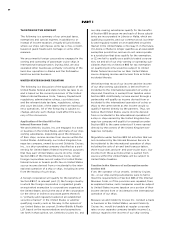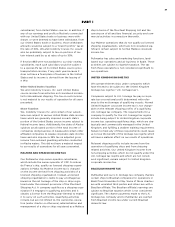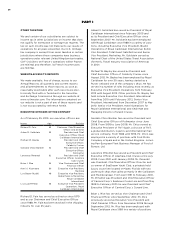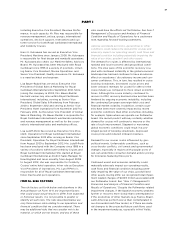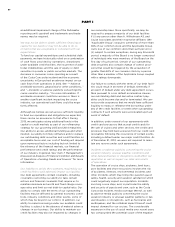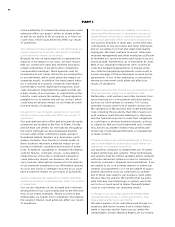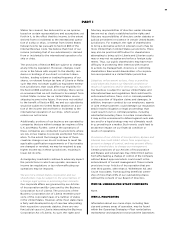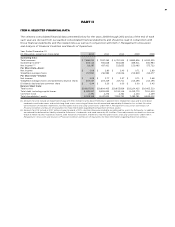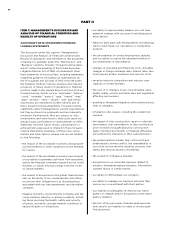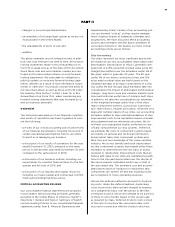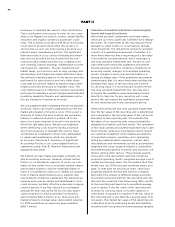Royal Caribbean Cruise Lines 2012 Annual Report Download - page 37
Download and view the complete annual report
Please find page 37 of the 2012 Royal Caribbean Cruise Lines annual report below. You can navigate through the pages in the report by either clicking on the pages listed below, or by using the keyword search tool below to find specific information within the annual report.
33
PART I
States tax counsel, has delivered to us an opinion,
based on certain representations and assumptions set
forth in it, to the effect that this income, to the extent
derived from or incidental to the international opera-
tion of a ship or ships, is exempt from United States
federal income tax pursuant to Section 883 of the
Internal Revenue Code. We believe that most of our
income (including that of our subsidiaries) is derived
from or incidental to the international operation of a
ship or ships.
The provisions of Section 883 are subject to change
at any time by legislation. Moreover, changes could
occur in the future with respect to the identity, resi-
dence or holdings of our direct or indirect share-
holders, trading volume or trading frequency of our
shares, or relevant foreign tax laws of Liberia or Malta
such that they no longer qualify as equivalent exemp-
tion jurisdictions, that could affect our eligibility for
the Section 883 exemption. Accordingly, there can be
no assurance that we will continue to be exempt from
United States income tax on United States source
shipping income in the future. If we were not entitled
to the benefit of Section 883, we and our subsidiaries
would be subject to United States taxation on a por-
tion of the income derived from or incidental to the
international operation of our ships, which would
reduce our net income.
Additionally, portions of our business are operated by
companies that are within tonnage tax regimes of the
U.K. and Malta. Further, some of the operations of
these companies are conducted in jurisdictions where
we rely on tax treaties to provide exemption from tax-
ation. To the extent the tonnage tax laws of these
countries change or we do not continue to meet the
applicable qualification requirements or if tax treaties
are changed or revoked, we may be required to pay
higher income tax in these jurisdictions, resulting in
lower net income.
As budgetary constraints continue to adversely impact
the jurisdictions in which we operate, increases in
income tax regulations or tax reform affecting our
operations may be imposed.
We are not a United States corporation and our
shareholders may be subject to the uncertainties of
a foreign legal system in protecting their interests.
Our corporate affairs are governed by our Articles
of Incorporation and By-Laws and by the Business
Corporation Act of Liberia. The provisions of the
Business Corporation Act of Liberia resemble provi-
sions of the corporation laws of a number of states
in the United States. However, while most states have
a fairly well developed body of case law interpreting
their respective corporate statutes, there are very
few judicial cases in Liberia interpreting the Business
Corporation Act of Liberia. As such, the rights and
fiduciary responsibilities of directors under Liberian
law are not as clearly established as the rights and
fiduciary responsibilities of directors under statutes or
judicial precedent in existence in certain United States
jurisdictions. For example, the right of shareholders
to bring a derivative action in Liberian courts may be
more limited than in United States jurisdictions. There
may also be practical difficulties for shareholders
attempting to bring suit in Liberia and Liberian courts
may or may not recognize and enforce foreign judg-
ments. Thus, our public shareholders may have more
difficulty in protecting their interests with respect
to actions by management, directors or controlling
shareholders than would shareholders of a corpora-
tion incorporated in a United States jurisdiction.
Litigation, enforcement actions, fines or penalties
could adversely impact our financial condition or
results of operations and/or damage our reputation.
Our business is subject to various United States and
international laws and regulations that could lead to
enforcement actions, fines, civil or criminal penalties
or the assertion of litigation claims and damages. In
addition, improper conduct by our employees, agents
or joint venture partners could damage our reputation
and/or lead to litigation or legal proceedings that
could result in civil or criminal penalties, including
substantial monetary fines. In certain circumstances
it may not be economical to defend against such mat-
ters and/or a legal strategy may not ultimately result
in us prevailing in a matter. Such events could lead to
an adverse impact on our financial condition or
results of operations.
Provisions of our Articles of Incorporation, Bylaws and
Liberian law could inhibit others from acquiring us,
prevent a change of control, and may prevent efforts
by our shareholders to change our management.
Certain provisions of our Articles of Incorporation
and Bylaws and Liberian law may inhibit third parties
from effectuating a change of control of the Company
without Board approval which could result in the
entrenchment of current management. These include
provisions in our Articles of Incorporation that pre-
vent third parties, other than A. Wilhelmsen AS. and
Cruise Associates, from acquiring beneficial owner-
ship of more than 4.9% of our outstanding shares
without the consent of our Board of Directors.
ITEM 1B. UNRESOLVED STAFF COMMENTS
None.
ITEM 2. PROPERTIES
Information about our cruise ships, including their
size and primary areas of operation, may be found
within the Operating Strategies—Fleet revitalization,
maintenance and expansion section and the Operations



